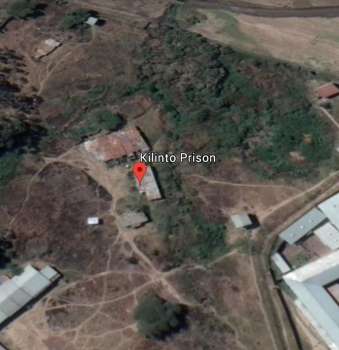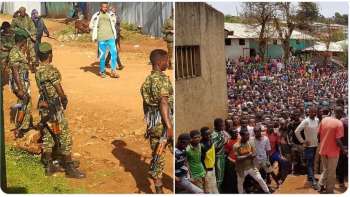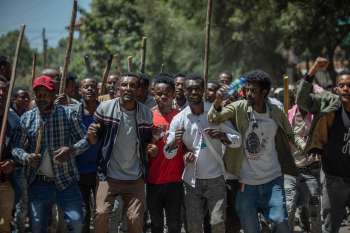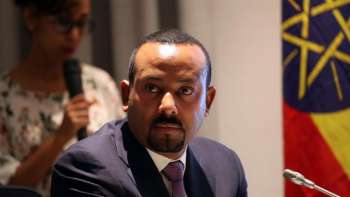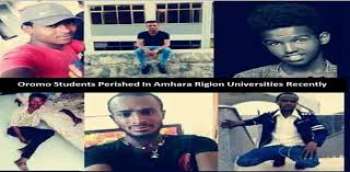In the Spotlight
Top Stories
Cable reference id: #10ADDISABABA370
“All of them, those in power, and those who want the power, would pamper us, if we agreed to overlook their crookedness by wilfully restricting our activities.” — “Refus Global“, Paul-Émile Borduas
Reference ID 10ADDISABABA370 |
|
|
Subject |
Environmental Allegations Generate Protests, Mass Arrests |
|
Origin |
Embassy Addis Ababa (Ethiopia) |
|
Cable time |
Mon, 22 Feb 2010 13:35 UTC |
|
Classification |
UNCLASSIFIED |
|
Source |
|
|
History |
|
|
Extras |
More than 450 Oromo Refugees killed in Yemen
More than 450 Oromo refugees were killed in a bomb attack at a Yemen prison reported March 7 2021. Refugees were being held by Houti forces in overcrowded prisons. Although the killers were not identified, recent Human Rights reports point to elements within the Houthi forces.
Yemen: Houthis Kill, Expel Ethiopian Migrants
The majority of the victims are Oromo Refugee as heard in the HRW video
Saudis Fire on Survivors, Detain Hundreds in Appalling Conditions
(Beirut) – Houthi forces in April 2020 forcibly expelled thousands of Ethiopian migrants from northern Yemen using Covid-19 as a pretext, killing dozens and forcing them to the Saudi border, Human Rights Watch said today. Saudi border guards then fired on the fleeing migrants, killing dozens more, while hundreds of survivors escaped to a mountainous border area.
Ethiopian migrants told Human Rights Watch that after they spent days stranded without food or water, Saudi officials allowed hundreds to enter the country, but then arbitrarily detained them in unsanitary and abusive facilities without the ability to legally challenge their detention or eventual deportation to Ethiopia. Hundreds of others, including children, may still be stranded in the mountainous border region.
“The lethal disregard Houthi and Saudi forces have shown civilians during Yemen’s armed conflict was replayed in April with Ethiopian migrants at the Yemen-Saudi border,” said Nadia Hardman, refugee and migrant rights researcher at Human Rights Watch. “United Nations agencies need to step in to address the immediate threats to the Ethiopian migrants and press for accountability for those responsible for the killings and other abuses.”
In June and July, Human Rights Watch interviewed 19 Ethiopian migrants, including 13 men, 4 women, and 2 girls, currently in Saudi Arabia or Ethiopia. The Houthi armed group, which took over the capital, Sanaa, in September 2014 in an armed conflict that a Saudi-led coalition joined in March 2015, have for many years controlled Yemen’s northwest border areas.
Migrants told Human Rights Watch that on or about April 16, Houthi fighters in green military uniforms brutally rounded up thousands of Ethiopians in al-Ghar, an unofficial migrant settlement area in Saada governorate. The Houthi forces, who were regularly seen patrolling the area, forced the migrants into pickup trucks and drove them to the Saudi border, firing small arms and light weapons anyone who tried to flee.
Witnesses said that Houthi fighters screamed that the migrants were “coronavirus carriers” and had to leave al-Ghar within hours. “They [Houthi forces] created chaos,” said an Ethiopian woman. “It was early in the morning [on April 16] and they told us to leave in two hours. Most people left, but I stayed. But after two hours, they started firing bullets and rockets – I saw two people killed.”
Another woman, who was pregnant and traveling with her young child, said the Houthi forces were using “rockets” to clear the area: “There were lots of Houthi soldiers. There were more than 50 trucks. They were firing a mortar which you put on the ground and it fires. Everyone started to run to escape. I ran with a group of 45 people – and 40 people were killed in my group. Only five of us escaped. They were not firing guns, just these mortars.”
Twelve of the migrants interviewed witnessed killings of migrants or saw their bodies, but the number killed could not be determined. Migrants who managed to return to al-Ghar found their tent settlement and surroundings destroyed. Human Rights Watch reviewed satellite imagery recorded immediately before, during, and after the alleged attack, and observed widespread destruction of over 300 tents and houses consistent with witness accounts.
Once migrants approached within one to two hundred meters of the border, Saudi border guards in gray and tan uniforms started firing at them with what witnesses described as mortar shells and rocket launchers. They said that Houthi forces responded by firing at the Saudi border guards and at any migrants who tried to escape from the chaos of the fighting back into Yemen.
Alarming news from Qilinxo !
As Ethiopia grapples to solve its multiple security issues ahead of the elections this year, an international human rights group has accused the East African nation’s security forces of arresting opposition supporters.
In a statement on 27 January, Amnesty International said Ethiopia had arrested 75 supporters of the Oromo Liberation Front (OLF) over the weekend.
- According to the human rights group, among those arrested was Chaltu Takele, a prominent political activist who spent more than eight years in prison before her release in 2016. She was also arrested twice after, in 2017 and 2019.
- Amnesty International also said the most recent arrests are part of a systematic arrest and release of opposition figures that has been going on since February 2019. Those arrested are taken for “rehabilitation training”.
Deprose Muchena, Amnesty International’s director for East and Southern Africa, said: “The return of mass arrests of opposition activists and supporters is a worrying signal in Ethiopia. These sweeping arrests risk undermining the rights to freedom of expression and association ahead of the 2020 elections.”
The home front
Just months ahead of the elections, Addis Ababa is trying to solve multiple security issues, as the number of hate crimes increase.
- Parts of Western Oromia have been shut off from the internet and phone services since late 2019. At a press conference in mid-January, EthioTelecom CEO Frehiwot Tamiru acknowledged the shutdowns and said they were “connected to peace and security” in the area, according to the Addis Standard.
- Several Ethiopian media houses have reported that OLF-Shane, the military splinter wing of the OLF, has been waging war against the government in the Kelem Wollega region.
Last November, Prime Minister Abiy Ahmed’s government deployed security forces to universities in Amhara and Oromo regions after a spate of ethnic-based clashes left three students dead. As the government closed down several universities, 18 students —14 of them female —were abducted while on their way home from Dembi Dollo University in Oromo.
- Both the Oromo Liberation Army and the government have accused each other of abducting the students, the VOA reported.
The government said it had secured the release of 21 of the abducted students, but the whereabouts and fates of the other 11 remains unknown.
In addition to these ethnic-based clashes, there has been a marked rise in religious-based hate crimes.
On 21 January, the Anadolou Agency reported attackers vandalised shops and other properties owned by Muslims in what has become a pattern of such attacks and counter-attacks in parts of Ethiopia.
Ethiopia’s elections, the first democratic exercise in 15 years, are scheduled for later this year. Some opposition groups have proposed they be postponed because of the escalating security issues as well as seasonal ones. The elections will tentatively be held in August, which also happens to be the rainy season in the region.
The regional and global issues
Meanwhile, PM Ahmed also has to grapple with security threats from outside of Ethiopia. For example, Israel suspended planned student trips to Ethiopia “following warnings against travelling to Africa by the Foreign Office.” Tel Aviv had already suspended direct flights to Addis Ababa, as part of measures to prevent attacks on its citizens during the ongoing US-Iran conflict.
On Monday, 27 January, the Prime Minister and two of his regional counterparts, Eritrea’s Isaias Afwerki and Somalia’s Mohammed Farmajo, agreed to work together and form a joint front in the region, promising to work together to deal with terrorism.
“The three leaders adopted a Joint Plan of Action for 2020 and beyond focusing on the two main and intertwined objectives of consolidating peace, stability, and security as well as promoting economic and social development,” a joint communique available on the Somalia President’s websites says.
- They also discussed security, as Somalia has been grappling with being the staging ground for home grown and international terror networks in the region. The three leaders said they agreed “to combat and neutralise the common threats they face, including terrorism, arms and human trafficking and drug smuggling”.
- And in a sign of their growing camaraderie, they also promised to prioritise their plan to “build, modernise and interface their infrastructure and develop their production and service sectors”.
The meeting in Asmara was the second time the three leaders had met to discuss how to navigate their multiple, related economic and social issues. With both Somalia and Ethiopia set for elections in 2020, there are mounting concerns of how their internal security issues could shape not just the polls, but also the Horn.
Nile dispute
Another regional issue that could play a role in the polls is the Nile Dispute. Ethiopia, Egypt and Sudan are also set to start for a second round of negotiations. The first round of talks, which were also hosted by Washington, collapsed amidst controversy of US President Donald Trump’s gaffe about which peace talks his diplomats were involved in.
- Both Ethiopia and Egypt have stuck to their talking points on the main issues, which include assurances of how much water Cairo will get, and how fast Addis Ababa can fill up its GERD dam on the Nile.
- After the first round of talks in early January, legal and technical experts from the three lower Nile countries retreated to Khartoum, where the river’s two main tributaries meet, to work on the details of a potential deal.
The bottom line: While Ethiopian PM and Nobel Peace Prize Winner Abiy Ahmed works to steady the ship at home and in the region, there are concerns about his security strategy at home. The arrest of opposition supporters is likely to shore up opposition against his government, which has the potential to escalate or morph into something else before August. In addition to the resurgence of armed groups in parts of the country, there’s also potential that some opposition groups could make unlikely partners to mount a formidable challenge to PM Abiy’s first elections.
Prime Minister Abiy Ahmed, this year’s winner of the Nobel Peace Prize, was in Russia when the protests broke out and has yet to publicly comment on the violence.
ADDIS ABABA, Ethiopia — Weeks after receiving the Nobel Peace Prize, Prime Minister Abiy Ahmed is coming under harsh criticism over his silence in the face of protests this week that police said had resulted in the deaths of 67 people.
Mr. Abiy remained at a summit meeting of African leaders in the Black Sea resort town of Sochi, Russia when thousands of people took to the streets of the Ethiopian capital and several regional towns on Wednesday.
The protests were spurred by a prominent critic of the prime minister who had accused the police of plotting an attack on him. The critic, Jawar Mohammed, is the founder of an independent media network, and claimed that there was a plan to arrest or possibly kill him at his house in the capital, Addis Ababa.
The accusations stoked longstanding tensions in Ethiopia, the second-most populous nation in Africa, and drove hundreds of Mr. Jawar’s ethnic Oromo supporters to gather outside his home.
Thirteen of those who died in the protests were killed by security forces and the remainder died in sporadic fighting that broke out between rival groups, said Kefyalew Tefera, the regional police commissioner for the Oromia region. He said that another 213 were injured. He did not say what the root cause of that fighting was or what groups were involved.
By Thursday night, Commissioner Kefyalew said, calm had been restored to the country, with “no kind of protest or violent activities.” Officials also announced on Friday that they had deployed soldiers to seven regional towns, including six in the Oromia region, after violence broke out this week.
“This will bring about stability in the areas in cooperation with the regional security forces,” Maj. Gen. Mohammed Tesemma of the Ethiopian Army said at a news conference.
Since coming to power, Mr. Abiy has released tens of thousands of political prisoners and been credited with ending the decades-long conflict between Ethiopia and Eritrea, its isolated neighbor. The Nobel Committee that awarded Mr. Abiy the Peace Prize on Oct. 11 cited the accomplishments of his first 100 days, including lifting a state of emergency, granting amnesty to thousands of political prisoners, halting media censorship and legalizing outlawed opposition groups.
But during his time in office, domestic tensions have festered between ethnic groups that feel emboldened by a renewed sense of political freedom.
Mr. Abiy’s failure to return to Ethiopia when the protests broke out, or to say anything to try to calm the tensions, has disappointed some Ethiopians.
“The fact he was in Russia, doing nothing to take measures, that is raising some eyebrows,” said Zemelak Aytenew, an associate professor in government studies at Addis Ababa University. “He’s supposed to be a prime minister. In other countries when these crises happen people abandon their invitations and take charge of the situation.”
“Like many people I feel ashamed he has not done more than he did in terms of taking charge of the situation,” Mr. Zemelak said.
Mr. Jawar, the Ethiopian media owner and activist, has sometimes been an ally, and sometimes a rival of Mr. Abiy. Earlier this week, before the protests erupted, Prime Minister Abiy warned Parliament that unidentified media owners were fomenting ethnic unrest.
Analysts say that Mr. Jawar, who is 33 and has American citizenship, could mount a convincing campaign to succeed Mr. Abiy in next year’s general election. Mr. Jawar fueled the protests that helped bring Mr. Abiy to power in 2018, after Prime Minister Hailemariam Desalegn was ousted.
Mr. Abiy now finds himself in the tricky position of having to quiet Mr. Jawar’s supporters while living up to his new acclaim as a global peacemaker.
“He does have the network to launch a party,” said Mr. Zemelak, of Addis Ababa University, though he said it was unclear how popular Mr. Jawar is in poorer and more rural areas of the country.
New Amnesty report documents extrajudicial executions, mass detentions during security operations in Amhara and Oromia.
The killing of Oromo civilians have gone on for decades by successive Ethiopian Regimes. This was worsened by
- Russian financial and military support of past Marxist regimes; The support included sending Russian and Cuban troops to Oromo and Ogaden Regions in 1978.
- Western financial and military Aid to the Ethiopian military; British were also involved in training Ethiopian Liyu police, who were implicated in direct violence against civilians.
Marginalization of these human rights crimes by the International community particularly the United Nations, amounts to complete disregard for humanity.
The United Nations and related bodies require a stern self reflection, and reform in order to restore confidence in the institutions that were designed to preserve humanity.
The video is in memory of Oromo civilians who were killed by the Ethiopian Regime, including Haacaaluu Hundessa.
A document released today describes killings, detentions and destruction in just five of 23 districts in one of Oromia Region’s 17 zones – over 127 civilians killed up to 3 April. The detailed report, compiled locally from eye-witness accounts in West Wallega, describes the targeted killing of Qeerroo members, youngsters elected to local offices after the reforms in 2018, following their propelling P.M. Abiy Ahmed to power.
We are pleading out to the world community concerning a deadly situation where thousands of Oromo University Students have been held hostage at various universities in the Amhara region of Ethiopia for almost a month.
The killing of Oromo civilians have gone on for decades by successive Ethiopian Regimes. This was worsened by
- Russian financial and military support of past Marxist regimes; The support included sending Russian and Cuban troops to Oromo and Ogaden Regions in 1978.
- Western financial and military Aid to the Ethiopian military; British were also involved in training Ethiopian Liyu police, who were implicated in direct violence against civilians.
Marginalization of these human rights crimes by the International community particularly the United Nations, amounts to complete disregard for humanity.
The United Nations and related bodies require a stern self reflection, and reform in order to restore confidence in the institutions that were designed to preserve humanity.
The video is in memory of Oromo civilians who were killed by the Ethiopian Regime, including Haacaaluu Hundessa.
A document released today describes killings, detentions and destruction in just five of 23 districts in one of Oromia Region’s 17 zones – over 127 civilians killed up to 3 April. The detailed report, compiled locally from eye-witness accounts in West Wallega, describes the targeted killing of Qeerroo members, youngsters elected to local offices after the reforms in 2018, following their propelling P.M. Abiy Ahmed to power.



